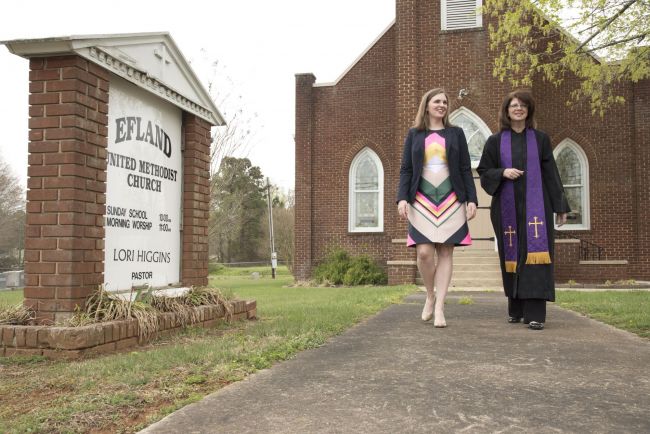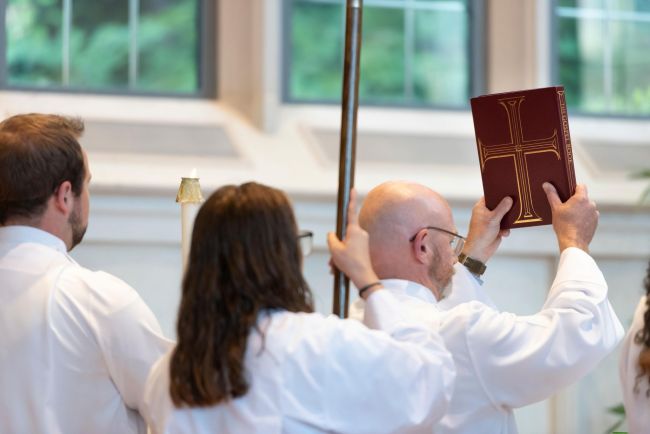Duke Divinity School offers abundant resources to provide a rich theological education as well as preparation for ordination in a variety of faith traditions. Our M.Div. degree and Hybrid M.Div. degree in particular offer the broadest and deepest program available in master's-level theological education, providing the academic foundation, spiritual formation, ministerial formation, and practical experience students need to answer the call to ministry.

UMC Ordination
Approximately 40 percent of our M.Div. students and nearly half of the Duke Divinity faculty are members in United Methodist or Wesleyan church traditions. As one of only 13 recognized UMC seminaries, Duke Divinity offers abundant resources to provide a rich theological education as well as preparation for your journey of ordination as an elder or a deacon in the United Methodist Church. Our M.A. in Christian Practice program provides a track for UMC students to fulfill requirements for ordination as a Deacon.
Ordination in Anglican and Episcopal Churches
Through the Anglican Episcopal House of Studies (AEHS) and the Certificate in Anglican Studies, we help students in the M.Div. and other degree programs fulfill the academic and formational requirements for Anglican/Episcopal ministry, ordained or lay. Many students arrive as aspirants or postulants, already sponsored by a bishop. The director of AEHS offers support to Anglican/Episcopal students who are discerning a vocation to the ordained ministry. These students are then encouraged to proceed with the usual processes of discernment, linked to a parish and diocese, whether in North Carolina or elsewhere.


Baptist Ordination
The Baptist House of Studies prepares students for Baptist ministry through theological education and participation in a supportive community as they are being formed for Christian ministry at the Divinity School. The Certificate in Baptist Studies is designed to serve the academic and formational requirements of M.Div. students preparing for ministry—ordained and lay—in the Baptist tradition. Interested students declare their interest to the Baptist House director and the Office of Academic Formation and are assigned a Baptist faculty advisor.
Duke Divinity School assigns incoming United Methodist students to United Methodist faculty advisors to help ensure that these students will be fully aware of disciplinary and other requirements for ordination. We have also developed specific United Methodist versions of our curricular paradigms (see the Divinity Bulletin) that include these required courses. See See our online paradigms for course requirements (current students only; NetID required).
Duke Divinity School offers the theological education necessary to complete the academic requirements for both the order of deacon and the order of elder through the United Methodist Church:
Elder
The United Methodist Church requires completion of the master of divinity (M.Div.) degree for those seeking ordination to “Word, Sacrament, Order, and Service” as an elder in full connection.
Deacon
For those seeking ordination to “Word,Service, Compassion, and Justice” as a deacon in full connection, the United Methodist Church has provided three educational options:
- Completion of a basic theological degree (MDiv, MTS) that includes the requirements for a minimum of 27 credit hours in basic graduate theological studies (Theology, Old Testament, New Testament, Mission of the Church in the World, Evangelism, Worship/Liturgy, Church History, and courses in United Methodist Doctrine, Polity, and History). All of the basic graduate theological studies requirements are also fulfilled by completion of the MACP degree.
- For those who already hold a professional master’s degree in the area of specialized ministry in which the candidate will serve (MSW, MA, etc.), the candidate must, in addition, complete a minimum of 27 credit hours in basic graduate theological studies at a graduate theological seminary recognized by the United Methodist University Senate. This academic route may be fulfilled as a Special Student.
- For those who are age 35 or older, there is the possible alternate route to ordination as a deacon through professional certification or licensing and additional graduate credit in one’s area of specialization, as well as the required minimum twenty-four credit hours of basic graduate theological studies. This academic route may be fulfilled as a Special Student.
For more information on the various routes of theological education for ordination, candidates are encouraged to contact the United Methodist Division of Ordained Ministry: (615) 340-7389 or dom@gbhem.org. Additionally, it always prudent for candidates to maintain communication with their own annual conference regarding additional requirements for theological education and preparation for ministry.
Learn more about preparing for ordination at Duke Divinity School.
Ordination Process
The Certificate in Baptist Studies is designed to serve the academic and formational requirements of those preparing for ministry – ordained and lay – in the Baptist tradition.
In addition, the Baptist House of Studies offers support and advice to students who are seeking ordination in various Baptist denominations.
The Certificate in Anglican Studies can be earned within a degree and is designed to serve the academic and formational requirements of students preparing for Anglican/Episcopal ministry, lay and especially ordained. The certificate is open to students in the M.Div. and M.T.S. programs.
The Anglican Episcopal House of Studies (AEHS) supports students who are considering ordination. Many students arrive as aspirants or postulants, already sponsored by a bishop. The director of AEHS also offers support to Anglican/Episcopal students who are discerning a vocation to the ordained ministry. These students are then encouraged to proceed with the usual processes of discernment.
The focus of all the activities of the AEHS is vocational, aiming to equip people to be wise, faithful, and fruitful servants of Jesus Christ in every aspect of their ministry—whether that be ordained or lay, in a parish or in the academy, in North America or elsewhere. The particular requirements for ordination are determined by a sponsoring bishop in liaison with the diocesan Commission on Ministry, not by AEHS or Duke Divinity School. These are tailored to individual circumstances and in many cases, it is agreed that the requirement for an “Anglican Year” can be met at Duke Divinity School. The director of AEHS is willing to serve as a liaison with the relevant personnel in an aspirant’s diocese on these matters when appropriate.